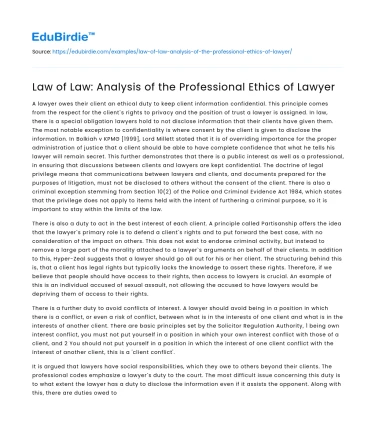A lawyer owes their client an ethical duty to keep client information confidential. This principle comes from the respect for the client`s rights to privacy and the position of trust a lawyer is assigned. In law, there is a special obligation lawyers hold to not disclose information that their clients have given them. The most notable exception to confidentiality is where consent by the client is given to disclose the information. In Bolkiah v KPMG [1999], Lord Millett stated that it is of overriding importance for the proper administration of justice that a client should be able to have complete confidence that what he tells his lawyer will remain secret. This further demonstrates that there is a public interest as well as a professional, in ensuring that discussions between clients and lawyers are kept confidential. The doctrine of legal privilege means that communications between lawyers and clients, and documents prepared for the purposes of litigation, must not be disclosed to others without the consent of the client. There is also a criminal exception stemming from Section 10(2) of the Police and Criminal Evidence Act 1984, which states that the privilege does not apply to items held with the intent of furthering a criminal purpose, so it is important to stay within the limits of the law.
There is also a duty to act in the best interest of each client. A principle called Partisanship offers the idea that the lawyer`s primary role is to defend a client`s rights and to put forward the best case, with no consideration of the impact on others. This does not exist to endorse criminal activity, but instead to remove a large part of the morality attached to a lawyer`s arguments on behalf of their clients. In addition to this, Hyper-Zeal suggests that a lawyer should go all out for his or her client. The structuring behind this is, that a client has legal rights but typically lacks the knowledge to assert these rights. Therefore, if we believe that people should have access to their rights, then access to lawyers is crucial. An example of this is an individual accused of sexual assault, not allowing the accused to have lawyers would be depriving them of access to their rights.
Save your time!
We can take care of your essay
- Proper editing and formatting
- Free revision, title page, and bibliography
- Flexible prices and money-back guarantee
There is a further duty to avoid conflicts of interest. A lawyer should avoid being in a position in which there is a conflict, or even a risk of conflict, between what is in the interests of one client and what is in the interests of another client. There are basic principles set by the Solicitor Regulation Authority, 1 being own interest conflict, you must not put yourself in a position in which your own interest conflict with those of a client, and 2 You should not put yourself in a position in which the interest of one client conflict with the interest of another client, this is a 'client conflict'.
It is argued that lawyers have social responsibilities, which they owe to others beyond their clients. The professional codes emphasize a lawyer`s duty to the court. The most difficult issue concerning this duty is to what extent the lawyer has a duty to disclose the information even if it assists the opponent. Along with this, there are duties owed to the public, however, if a lawyer owes a duty to the state more widely then would that lawyer have a duty to act on the information, they come across that indicates a major risk to public health or finances.
According to the Bar Standards Board (BSB): You owe a duty to the court to act with independence in the interest of justice. This duty overrides any inconsistent obligations other than those under criminal law.
The Lawyers job is to carry out their client`s demands within the limits of the law. Therefore, if the ethical dilemma does not breach codes of ethics and the BSB rules then the lawyer should carry out the client's wishes. If the lawyer`s ethics clash to the extent that they cannot continue the case, then they should exit their position as the client`s lawyer.
If the ethical disagreement is due to the client confessing guilt, then from a legal perspective the lawyer can enter a not guilty plea on the basis that the prosecution has not provided its case beyond a reasonable doubt, although the lawyer would not be able to present any evidence in court that his or her client did not commit the crime. This is because a lawyer is not permitted to deceive the court. Contrastingly from an ethical position the lawyer can either continue representing their client in the matter stated or decide to withdraw as the client's lawyer.
The lawyer should understand that they are representing their client`s interests and not their own, and thus there will be conflicts that arise inevitably in multiple cases. The lawyer`s ethical position should lead to a disagreement only if they cannot represent the client if they are firm on their side of the disagreement.
Concluding, where a lawyer disagrees with their client`s ethical judgment, the lawyer`s own interest, and ethical views should only be relevant if the disagreement has reached the point to which the lawyer will not continue representing the client as a result of these conflicts. However, if the lawyer can continue representing the client, without their conflicting ethics restricting them from presenting the best case possible, then they should do so, and their ethics will be irrelevant. The ethical disagreement is assumed to not be one where the client has admitted guilt or where the lawyer will be breaking their duty to the court and public. In this case, then the lawyer should act within the scope of the law.






 Stuck on your essay?
Stuck on your essay?

